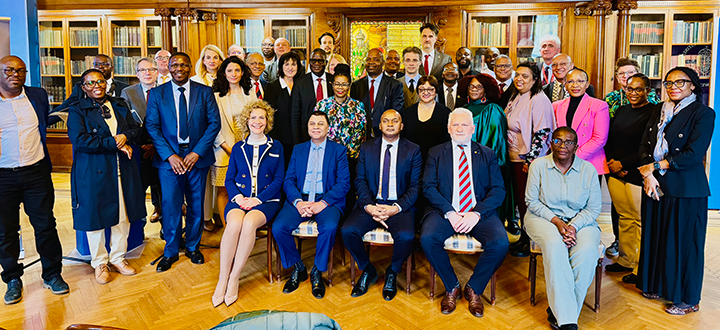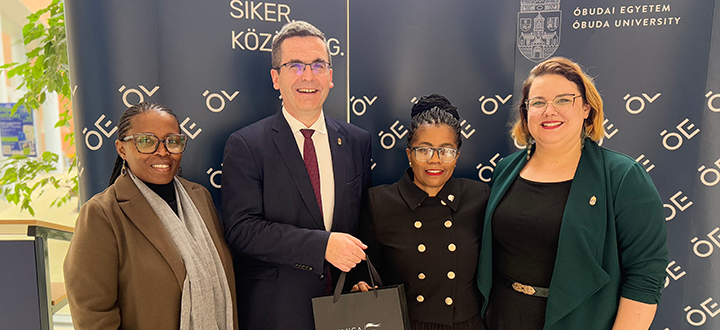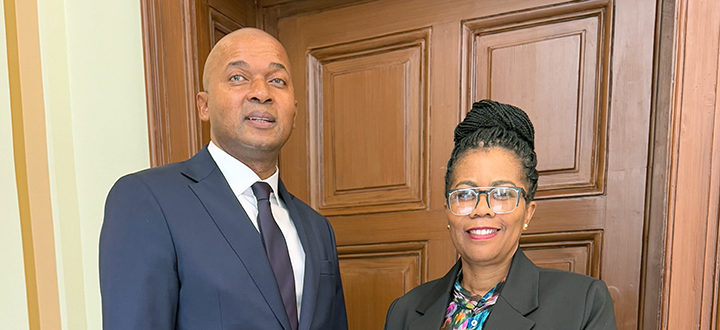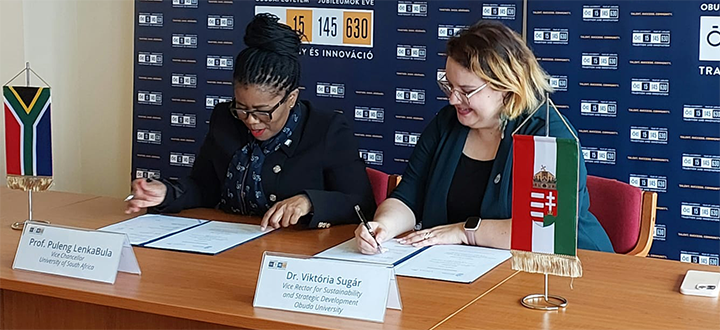News & Events
Unisa strengthens ties with Hungarian HE institutions
Unisa Principal and Vice-Chancellor (VC), Professor Puleng LenkaBula, accompanied by Dr Angie Magabane, Director: Internationalisation and Partnerships, is currently participating in the Hungarian Rectors’ Conference, held from 31 March to 04 April 2025 in Budapest, Hungary. One of the highlights of the conference thus far was the Hungarian-South African Rectors’ Forum, a platform created by Universities South Africa (USAf) in collaboration with the Hungarian Rectors’ Forum.

Hungarian-South African Rectors’ Forum delegation
The forum brought together South African university vice-chancellors and their Hungarian counterparts from more than 60 Hungarian universities to engage and network through high-level meetings, study visits to selected universities, and roundtable discussions with the purpose of exploring synergies and sharing experiences.
These engagements culminated with the Unisa VC signing a memorandum of understanding (MoU) with Óbuda University, located in Budapest, Hungary. Earlier this year, Unisa signed an MoU with Eötvös Loránd University, Hungary’s oldest and largest university, also located in Budapest.
Potential for expansion
Hungary is a strategic partner to South Africa, particularly in higher education. This long-standing partnership has enabled over 200 South African students to study at and graduate from various Hungarian universities through the support of the Hungary’s Stipendium Hungaricum scholarship programme.

From left: Dr Angie Magabane, Director: Internationalisation and Partnerships, Unisa, Prof Dr Levente Kovács, Rector: Óbuda University, Unisa Principal and Vice-Chancellor, Prof Puleng LenkaBula, and Dr Viktória Sugár, Vice-Rector: Sustainability and Strategic Development, Óbuda University
In addition, these scholarships continue a tradition of support that Hungary extended to South Africa to provide education and training opportunities to young South Africans as part of its solidarity with the anti-apartheid movement in the early 1960s and 1970s. Furthermore, Hungary’s role as President of the Council of the European Union coupled with South Africa’s G20 Presidency and the hosting of the 2025 G20 summit later this year, offer an even more compelling reason for Unisa to expand its footprint in Hungary and cement its position as a credible partner in knowledge production and research.
These crucial engagements have the potential to open more opportunities for collaboration and knowledge sharing among academics and intellectuals from both countries.
On the first day of the programme, the South African universities’ vice-chancellors had an engagement with the South African Ambassador to Hungary, His Excellency Gangumzi Tsengiwe, where discussions took place on topics about the relations between South African universities and their Hungarian counterparts. The South African delegation proceeded to highlight the specific collaborations their universities have with the Hungarian universities and outlined the expected outcomes of the mission.

His Excellency Gangumzi Mattias Tsengiwe, Ambassador of South Africa to Hungary, with Unisa Principal and Vice-Chancellor, Prof Puleng LenkaBula
Unisa’s collaborations with Hungarian universities
Unisa’s participation as member of the USAf delegation is strategic and timely in that there has been an increase in the number of Hungarian universities seeking to collaborate with Unisa in numerous areas, particularly areas that will advance teaching, research, engaged scholarship, and the university’s catalytic niche areas.
Unisa’s access to the Erasmus+ Programme funded by Tempus Public Foundation (a Hungarian national agency) continues to enable the university’s staff and students to participate in the Erasmus+ International Credit Mobility Programme for the 2024-2027 project cycle. The Unisa College of Human Sciences is the implementing partner, with the Department of History leading. The nomination of two staff members from the department who will participate in this programme for 2025 is under way.
MoU with Óbuda University
The collaboration between Unisa and Óbuda University started in December 2024 as a result of Unisa’s engagements with the Embassy of Hungary which assisted in arranging a visit to Unisa by an Óbuda University delegation, led by Professor Dr Miklós Kozlovszky. The delegation held discussions with their counterparts at the College of Science, Engineering and Technology’s School of Computing, which led to a decision to sign an MoU. The MoU will enable the implementation of projects in various disciplines, including artificial intelligence, Industry 4.0, robotics, materials engineering, production design, and medical informatics. Included also is participation in the Erasmus+ Mobility Programme funded by the European Union (EU), and the Hungary-funded Pannonia Programme.
The signing of the MoU between Unisa and Óbuda University symbolises a commitment by the two universities to solidify their partnership. Óbuda University is a strategic partner for Unisa as it offers a range of engineering and technology programmes at both undergraduate and postgraduate levels, which will allow for the mutual exchange of knowledge, teaching skills, research, and engaged scholarship. Óbuda University is ranked among the best universities in the world, and is second in the rankings in Hungary.

(During the Mou signing in Hungary) Unisa Principal and Vice-Chancellor, Prof Puleng LenkaBula, and Dr Viktória Sugár, Vice-Rector: Sustainability and Strategic Development, Óbuda University
At the heart of the matter
The MoU commits the two universities to implement projects and activities in the following areas:
- Joint research activities and raising funds (EU research funds and tenders) on mutual topics to improve reputation and positioning in the higher education market
- Exchange of graduate and postdoctoral students to further cultural, academic research, and scientific exchanges
- Exchange of faculty, staff, and scholars to further joint academic publishing, and cultural and scientific exchanges between the parties
- Exploring joint MSc and PhD programmes and degrees
- Digital and web resources for joint educational programmes (distance learning, e-conferencing)
- Participation in seminars, workshops, and academic meetings
- Exchange of academic materials, publications, and other information
- Special short and long-term programmes and visits
- Promotion of joint academic publications, and other identified programmes
Speaking at the signing, Unisa’s Magabane emphasised that the partnerships with Óbuda University and Eötvös Loránd University are crucial for Unisa as it will assist in championing the advancement of knowledge in three of the university’s catalytic niche areas: Fourth Industrial Revolution and digitalisation, Energy studies, and Student support and co-curricular activities.
* By Dr Angie Magabane, Director: Internationalisation and Partnerships, with additional input by Godfrey Madibane, Acting Journalist, Department of Institutional Advancement
Publish date: 2025-04-03 00:00:00.0

